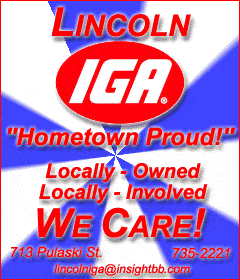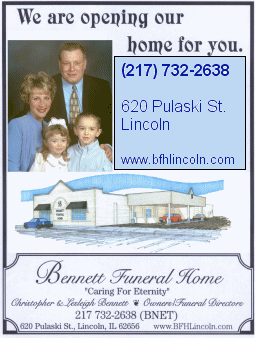|
Abraham Lincoln Memorial Hospital wants to know your thoughts about
health care needs in the future. This week they will send a brochure
and five-question survey to every area home and business. Community
members are asked to read the information, fill out the postage-paid
survey and return it to ALMH.
This request for community feedback
is all part of a two-year project called ALMH 2010. ALMH President
and CEO Woody Hester explains that both the hospital board of
directors and administrators are taking a "timeout" to evaluate this
community's health care needs in the year 2010 and beyond.
"The biggest threat to any
organization is that its leaders become so caught up in the
day-to-day challenges that they neglect to look toward the future,"
Hester says. "What results is an organization so far behind the
times that it can never catch up. I don't want ALMH to ever be in
that situation."
So, ALMH is asking community members
for their ideas about future health care needs.

The informational brochure and
survey will give every household in the ALMH service area a chance
to learn about ALMH's needs for the future and four options for
meeting those needs. Choices range from "most conservative," a plan
in which ALMH upgrades technology and remodels interior spaces as
needed, to a "most aggressive" approach of building a brand-new
21st-century health care center. In between are two options for
dramatically expanding and renovating the current facility at 315
Eighth St.
Already, ALMH has heard from 114
local citizens in eight community focus groups at ALMH, Emden and
Mount Pulaski. There is still another focus group planned for March
9, as well as presentations to the Lincoln Rotary, Kiwanis and Zonta
clubs.
Those with additional comments about
the ALMH 2010 choices are encouraged to send an e-mail to
2010@almh.org.
[to top
of second column in this article] |

In mid-April, ALMH leaders will summarize the
feedback they have received from the community. The ALMH board of
directors will review this information, along with architectural advice
and financing options, to make a final recommendation in the fall of 2005.
Driving the 2010 discussion is the
need to update ALMH's energy plant, which is estimated to cost $10
million. Right now ALMH is operating on a 1950s single-loop climate
control system. "We either have to heat the entire building or cool
the entire building -- and that makes the temperature pretty
uncomfortable for patients and employees at least six months out of
the year -- not to mention how inefficient it is with today's energy
costs," explains Hester.
Another need identified by ALMH
staff is more room on the main floor for easy-to-access outpatient
care. Experts predict that an aging population and new technology
will lead to a 30 percent volume increase in outpatient care,
including more demand for already busy services such as physical
therapy, diagnostic imaging and same-day surgery. New technologies
will also enable community health care centers like ALMH to perform
many more outpatient procedures in the future that in the past have
been reserved for larger medical centers.
The goal of the ALMH 2010 project is
to create a convenient, friendly, high-quality "health center" that
provides "feels really good" care and services to a predominantly
outpatient population. "Yet only our community can define 'feels
really good' care," stresses Hester. "This survey gives them the
opportunity to tell us what kind of project they prefer and are
willing to support."
[Marty Ahrends, executive
director of community development, Abraham Lincoln Memorial Hospital]
 |



